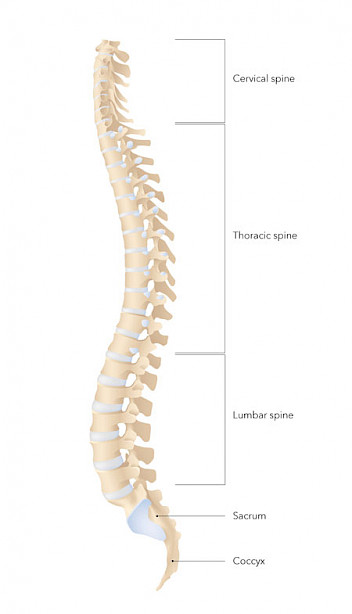
The spinal surgery department deals with injuries and diseases of the spine and spinal cord. It is the interface between various disciplines, such as orthopaedics and neurosurgery. The spinal surgery department covers both conservative and surgical treatments.
Back pain can have a variety of causes. We provide sensitive and competent advice for acute and chronic complaints such as inflammatory diseases (rheumatism), degenerative processes (osteoarthritis of the vertebral joints), tumours, osteoporosis, injuries and fractures of the spine, herniated discs and curvature of the back (kyphosis/scoliosis).
Click on the desired speciality to obtain further information on diagnosis, therapy and treatment options.

The spinal column consists of 24 movable building blocks (vertebrae) and serves as a mobile support for the body by bearing the weight of the upper extremities, trunk, neck and head. The vertebrae are connected to each other by ligaments and intervertebral discs. The spinal column includes seven cervical vertebrae, twelve thoracic vertebrae and five lumbar vertebrae as well as the spinal cord. The sacrum and coccyx form the transition to the pelvis.
Depending on the diagnosis, our clinics offer various treatment options for problems with the spine, from conservative, pain-relieving therapies to surgical interventions.
This cannot be answered in general terms: it depends on the type of surgery performed and the reason for the surgery. Surgery near the spinal cord always carries a certain risk. Therefore, establishing the right indications, considering all the factors, and choosing an experienced surgeon are very important. After all, complications such as pain, infection or nerve damage can occur with any operation. Doctors will provide you with detailed information about each specific complication and how it might be prevented or resolved.
It depends on the type of surgery and the reason for it. The type of work you do also plays a role. Depending on the procedure, you may not be able to return to work for up to eight weeks for light work and up to six months for heavy physical work. In certain cases, unfortunately, it may be retrain for a different role, as the strain on the back has to be permanently reduced.
Spine treatments at Clinique de Genolier